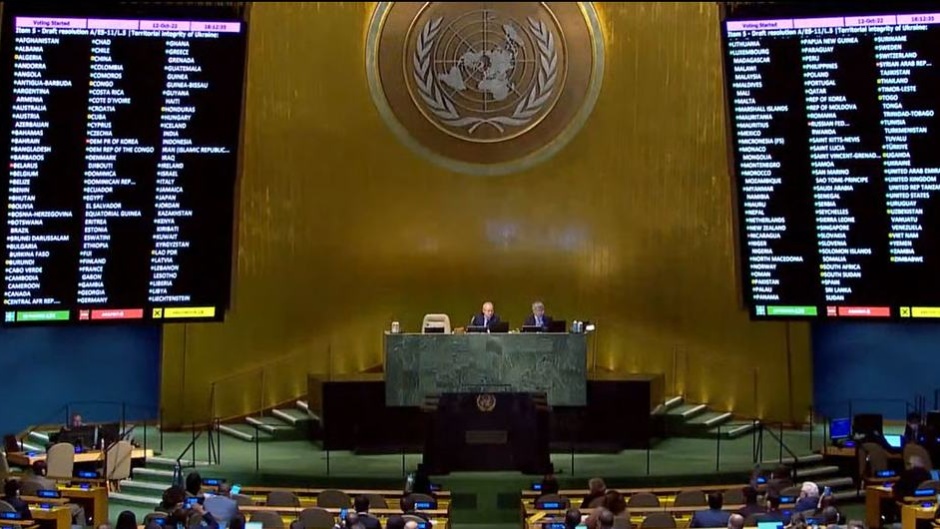The unholy alliance of the Russian church and state is a lesson for Christian nationalists everywhere.
 Vote in the United Nations General Assembly in favor of a resolution condemning Russia's illegal referendum in Ukraine. [link]UN news[/link]
Vote in the United Nations General Assembly in favor of a resolution condemning Russia's illegal referendum in Ukraine. [link]UN news[/link]
Saturday October 8 started with a huge bang and a ball of fire as part of the Kerch Bridge between Russia and Crimea blew up. A 70th birthday gift to President Putin from the Ukrainians?
The Kremlin quickly circulated a story about a lorry blowing up, but closer inspection of video footage of the explosion reveals a fireball erupting just behind the truck which thus was not the cause.
Some explosion from under the bridge seems to have wreaked the damage, suggesting an outrageously successful act of sabotage.
Hot anger unleashed more than 80 rocket attacks on 15 Ukrainian cities within 48 hours, targeting critical infrastructure.
Ira, a colleague in Kyiv, wrote that Ukrainian intelligence warned that Russia had been planning this attack in advance. It was not a hastily-planned retaliation for the Crimea bridge. She cast this positive light on events:
‘We knew that attacks on critical infrastructure were in store for us this winter, and we were getting ready. Of course, we wish this hadn’t happened, yet there are reasons to praise God. Had Russia waited and conducted this attack in the middle of winter when the temperature was extremely low, it would have been a great shock and would have had much more severe consequences for the people. However, they wanted a “big gesture” now, which helps us better prepare for the winter, and now even skeptics are stocking up on candles and warm clothes.’
This brutal Russian reaction only served to consolidate global opposition towards Russia’s aggression in the United Nations General Assembly condemnation by a vote of 143-5 of Russia’s ‘attempted illegal annexation’ of four Ukrainan regions.
None of the above however is likely to change Putin’s resolve to continue to send thousands of young Russians to their death.
According to Ira, a large group of recently mobilized Russian soldiers surrendered themselves this week to the Ukrainian armed forces. Sent to fight without a boot camp, warm clothes or ammunition, they were threatened to be shot if they retreated. To save their lives, they killed their commander and surrendered.
Two articles were recently sent to me with key perspectives.
One-time Russian presidential candidate, Alexei Navalny, serving a nine-year sentence for being a pain in the presidential butt, warned western leaders against short-term thinking in a Washington Post article smuggled out of his prison.
Getting rid of Putin would not resolve the problem of Russia. ‘The threat to peace and stability in Europe is aggressive imperial authoritarianism, endlessly inflicted by Russia upon itself,’ he wrote.
‘Without a major change in Russia’s governmental structure into a parliamentary republic, postwar Russia, like post-Putin Russia, will be doomed to become belligerent and Putinist again’.
War was still seen by Russian leaders as ‘an amazing means of solving all problems, he argued. It’s worth reading the full article.
The second article carried lessons from the unholy alliance of the Russian church and state for Christian nationalists everywhere, according to Christian political commentator, David French.
Events in Russia expose Christian nationalism as a blueprint for corruption, brutality and oppression, he argues. Putin portrays himself as the defender of Christian civilisation, fusing the Russian Orthodox Church and the FSB, justifying his Orthodox jihad.
On the surface, Christian nationalism may seem to be worthy of support from Christians. Putin is upheld by many American Christian nationalists as a model to follow.
Appearing in different countries at different times in history, Christian nationalism holds that the nation (America, England, Hungary, the Netherlands, Russia, Spain, Italy…) is defined by Christianity, and that the government should keep it that way.
Christianity should enjoy a privileged position in the public square. Sounds reasonable – but is dividing church and nation in America right now.
In both Russia and America, the argument is used that forces are at work to destroy traditional Christian civilisation. This threat requires government intervention to ‘reward friends and punish enemies’.
Government is then tied to a specific allegedly Christian moral vision. Character must not get in the way of the pursuit of power – a position now held by many American Evangelicals.
But, warns French, power corrupts; christendom dilutes Christianity; and brutality isn’t strength.
Lastly, a wonderful story of hope from the EEA Hope for Europe congress last week in Sarajevo Romkje and I attended.
When Russia launched its invasion of Ukraine in February, Martina Köninger of the European Disabilities Network immediately initiated five transporters to travel to the Ukrainian border to rescue handicapped people who are of course most vulnerable in a war situation.
After overcoming numerous challenges, including the closing of the Hungarian border (!), they were eventually able to relocate an initial 35 disabled persons. Over time more than 600 disabled and their families and/or carers were brought to safety!
Let justice run down like a river and righteousness like a mighty stream. Amos 5:24
Jeff Fountain, Director of the Schuman Centre for European Studies. This article was first published on the author's blog, Weekly Word.

Las opiniones vertidas por nuestros colaboradores se realizan a nivel personal, pudiendo coincidir o no con la postura de la dirección de Protestante Digital.
Si quieres comentar o